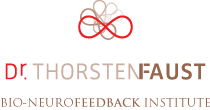INSOMNIA
DIFFICULTIES WITH FALLING ASLEEP AND/OR REMAINING ASLEEP THAT, IF THEY PERSIST, INTERFERE WITH PEOPLE'S PERSONAL AND PROFESSIONAL LIVES.

Increasingly large numbers of people suffer from insomnia in our modern day. These difficulties can consist of problems with falling sleep (conciliation insomnia) or waking up and being unable to fall asleep again (maintenance insomnia).
In the medium term, both of these types of insomnia wreak havoc on patients' lives, where common symptoms are exhaustion, irritability, stress and anticipation anxiety, worrying about not being able to sleep well that night. This all has an impact on people's professional, school and/or personal lives, creating a vicious cycle that is difficult to break.
Using Neuro-biofeedback we work on key issues of insomnia. When people visit us with this disorder, we analyse their particular case, especially concentrating on the factors that could have caused or intensified the problem, as well as those habits that maintain or worsen insomnia.
We establish guidelines on sleep hygiene and then work with Neuro-biofeedback, based on decreasing high cortical activity (presence of continuous and persistent thoughts). To achieve this, we work with cognitive relaxation techniques to help patients self-regulate cortical excitability. The goal is to break the vicious circle that starts with hyperarousal (hyperexcitation at an emotional, cognitive, physiological and physical or motor levels).
The impact of Neuro-biofeedback on sleep disorders is clear, as basic brain regulatory functions are addressed. Results are highly satisfactory, endure after the treatment and have no side effects.
If necessary and, as agreed with patients, we offer psychological treatment in combination with Neuro-biofeedback training.


